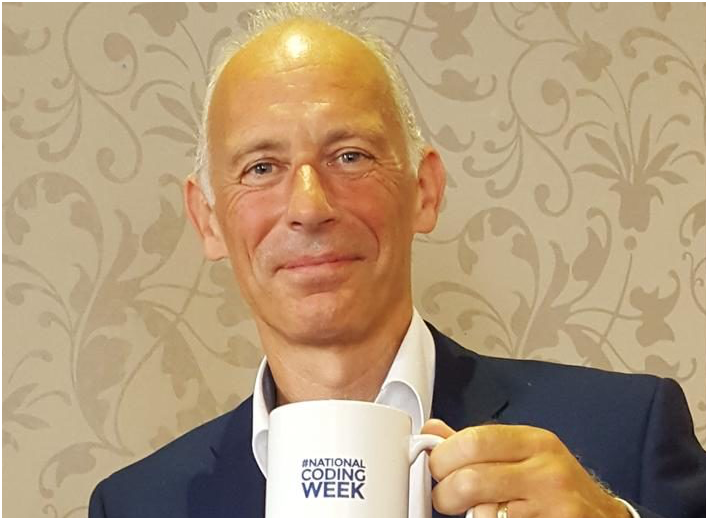Richard Rolfe – Founder of National Coding Week Tells His Story

21st August 2018
![]()
Background
In 2010 my work life and family life came to a grinding halt. I was a fit and healthy individual who hadn’t taken a sick day for 10 years. I was a runner, gym enthusiast, non-smoker and had a healthy diet. After a routine visit to the doctor for a well-man check I discovered I had a large tumour and had bladder cancer.
I was a headteacher in Jersey – I’d really enjoyed my career up to that point, but I made a decision that if I survived, I wanted to try something else in the next stage of my life.
A few years into my recovery I ran into an ex-pupil of mine, Jordan, who was in the process of setting up his own web development business. I was incredibly impressed by everything he’d achieved at such a young age, but also struck by how out of touch I felt with the technology he was working with.
This bothered me, so over Christmas 2013, rather than sitting on the sofa watching TV, I decided to learn how to write computer code. I learnt to build basic websites using an online course and really enjoyed it but I also found it frustrating. When I faced a problem I couldn’t ask for help.
It struck me that whilst there was government investment in a new computer science curriculum for school children, there wasn’t enough being done to support adults. My concern what there wasn’t enough being done to support teacher training especially for non-specialists. Parents and governors needed training too. It was also obvious to me that most people aren’t in education so I wondered what was being done to support and retrain those who had missed out on digital skills training or for older people who wanted to switch career or become more cybersecure.
So I teamed up with my ex-pupil and we started working on training initiatives specifically aimed at adults including teachers, parents, business leaders and the unemployed. In September 2014 we officially launched National Coding Week on top of a Double Decker bus in London, and the rest is history!
“Back in 2007, when the global financial crisis hit, the app economy didn’t really exist in any meaningful sense.”
Growing Opportunities
You don’t need to go to university to become a digital professional.There are some jobs that require a degree level computer science qualification, and that’s not likely to change. However there was a report recently that polled around 200,000 professional app developers all over the world, and they discovered that 83% were self-taught!
That’s a pretty clear indication that there’s ample opportunity for people without formal qualifications to enter into the digital space. You may not have a degree in Computer Science, but you can build a portfolio showing that you have the aptitude and enthusiasm to practice the necessary skills in your own time. Employers are more and more interested in your experience than they are in where you studied or what your cultural or social background is.
“There’s ample opportunity for people without formal qualifications to enter into the digital space.”
Bootcamps
Some people can learn everything online, others require more intensive and supportive face-to-face courses.
Lots of coding bootcamps are springing up around the country offering the opportunity to learn coding skills in a week, in a month or in three months.The opportunities to learn coding are growing every day. It can be quite a lonely and frustrating experience learning to code by yourself, attending a training session or a bootcamp gives more structure to your learning and when you’re faced with a problem you can ask for help.
Back in 2014 when I first started to work with Jordan, we taught half day courses and one day courses to adults who wanted to get confident in learning to code. We then signposted ways for them to learn more and encouraged them to build a portfolio. Some individuals attended the courses out of curiosity whilst others were looking to take the first steps to changing careers.
We then set out to train people for longer, setting up bootcamps for the unemployed, for those with autism of for those who had barriers in their life. A significant number were able to gain employment after the course. We found it wasn’t just about the coding but it was also about building confidence, developing problem solving skills and of course, having fun!
“National Coding Week will help to make whole generations of Brits more comfortable with coding, allowing them to embrace the business opportunities of the future.” Boris Johnson
National Coding Week 2018
I am now working with another amazing youngster Jonathan Channing He left school with no qualifications, was unemployed and diagnosed with autism aged 19. After attending a coding course he gained the confidence and skills to build a successful web design business. He is also a key volunteer for National Coding Week.
So how can people get involved?
ToolKits have been produced for Libraries, Hubs, Businesses, Schools, Meet Ups and Individuals. These toolkits give tips, ideas and advice for holding events. National Coding Week.
National Coding Week relies on volunteers to inspire others within their communities to learn digital skills but it’s main aim is to give people the opportunities and confidence to take the first steps on the road to a digital future.
I thought my teaching days were over when I got cancer but I now see that my passion for teaching and for helping people to learn can inspire others to learn new skills and perhaps, like me, have a life changing career move.